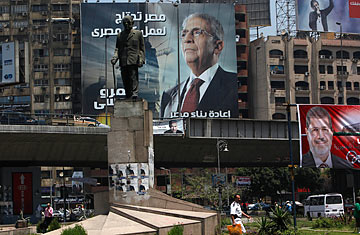
A statue of Egypt's Nobel laureate Naguib Mahfouz is back dropped with two electoral posters of presidential candidates Amr Moussa, left with Arabic that reads, "Egypt's reconstruction needs the effort of all Egyptians," and his fellow candidate Mohammed Morsi, right, in Cairo, May 8, 2012.
(2 of 2)
Moussa, 75, served in Egypt's foreign ministry for more than four decades; and in the 1990s, he was a fundamental component of Mubarak's government. He became particularly popular after publicly criticizing Israel — Mubarak's ostensible ally. Analysts suspect that surge in popularity was a primary reason for Moussa's transfer to the Arab League in 2001 — a move they say Mubarak may hafe chosen in order to reduce Moussa's time in the limelight and eliminate him as a potential political threat. For his part, Moussa has sought to portray the last 10 years as a period in which he engaged in lofty diplomatic endeavors, while remaining outside of politics. But he has suffered from his notable unwillingness to criticize Mubarak while he was in power, and when rumors circulated in 2009 that he might run for president, Moussa coyly deflected them — eventually saying that he would back Mubarak's bid for another term.
In a recent interview with TIME, Moussa still stopped short of indicting the ousted dictator, who now awaits the verdict in a nearly yearlong trial. "President Mubarak as a personality, in particular when I was minister, was always engaged and trying to listen," he said. "The first ten years, he was trying to do whatever he could in order to deal with a very bad economic situation."
Moussa's critics say that much of his popular support on the campaign trail today comes from those who supported the ex-regime, including the country's politically connected upper classes and those who benefitted in local, rural politics. "All the people here have been rented with money," claims Adel Ahmed, a government bureaucrat in the town of Dikarnis after Moussa addressed a crowd there. "Amr Moussa is from the old regime. We want a leader from Tahrir Square."
In contrast to Moussa, Aboul Fotouh has painted himself as a man who has spent a lifetime in staunch opposition to the country's authoritarian regime — credentials that have earned him a diverse following from hardcore Islamists to leftists and even liberal youth. But he, too, has a weakness, many voters point out — and it's one that Moussa has proven eager to exploit. Aboul Fotouh, 60, spent decades as a member of Egypt's once-banned Muslim Brotherhood, the most powerful opposition group under Mubarak. And his detractors question whether he continues to hold an allegiance to the powerful Islamist group, which controls the lion's share of the newly-elected parliament, despite his ouster from the Brotherhood last year when he declared his intention to run for president. (The group has since reversed its policy against running a candidate, and is pushing the head of its Freedom and Justice Party, Mohamed Morsy, for the position. All in all, there are 13 candidates running for president.)
In the same way that Moussa has sought to balance the positive with the negative aspects of a paradoxical past, so too has Aboul Fotouh. In the same breath that he has refuted any current ties to the Brotherhood, the doctor and former head of the Arab Medical Union has also defended his former membership in the Brotherhood as evidence of strong opposition credentials, and proof that he represents the fundamental opposite of the regime's legacy of corruption, abuses, and mismanagement. He has served prison sentences for advocating his views and in 1977 famously confronted Anwar Sadat during a Cairo University lecture and accused the then-President of being surrounded by sycophants. On the campaign trail, Aboul Fotouh has championed free speech, free education, and a set of social reforms during his booming speeches, which draw hundreds of cheering supporters from a range of political groups.
But the self-proclaimed moderate has also taken a series of bold Islamist stances in recent days — like a pledge to ban alcohol — that his opponents say reveals his true extremist values, or at best, his willingness to cater to the ultra-conservative Salafi bloc that has endorsed him since their candidate was disqualified by the electoral committee last month. Moussa, for his part, has publically referred to Aboul Fotouh as a "sheikh" — a deferential title reserved for a religious or tribal leader, but also a measured use of campaign rhetoric, says one of Moussa's aides. "We said 'sheikh' because you're coming from a political-religious background, Mr. Aboul Fotouh. The lines between you and them [the Brotherhood] are gray."
With reporting by Sharaf al-Hourani
